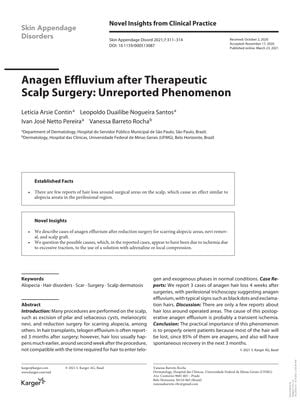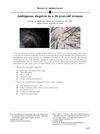Anagen Effluvium After Therapeutic Scalp Surgery: Unreported Phenomenon
January 2021
in “
Skin appendage disorders
”
anagen effluvium scalp surgery scarring alopecia nevi removal scalp graft trichoscopy transient ischemia excessive traction adrenaline solution local compression hair loss hair transplant scar removal mole removal hair graft hair examination temporary blood flow reduction pulling force epinephrine solution pressure

TLDR Hair loss can occur about 4 weeks after scalp surgery but usually grows back within 3 months without treatment.
The document reports on a phenomenon called anagen effluvium, which is hair loss occurring approximately 4 weeks after scalp surgery. This condition was observed in three patients who underwent different scalp surgeries, including reduction surgery for scarring alopecic areas, nevi removal, and scalp graft. The hair loss was characterized by black dots and exclamation hairs on trichoscopy, suggesting anagen effluvium. The authors propose that the cause of this hair loss is likely transient ischemia due to factors such as excessive traction, use of a solution with adrenaline, or local compression during surgery. The significance of this finding is that patients can be informed that although most of the hair in the anagen phase (85%) will be lost, it is expected to recover spontaneously within the next 3 months without the need for treatment. The study emphasizes the importance of careful surgical techniques to potentially reduce the incidence of this type of hair loss.








